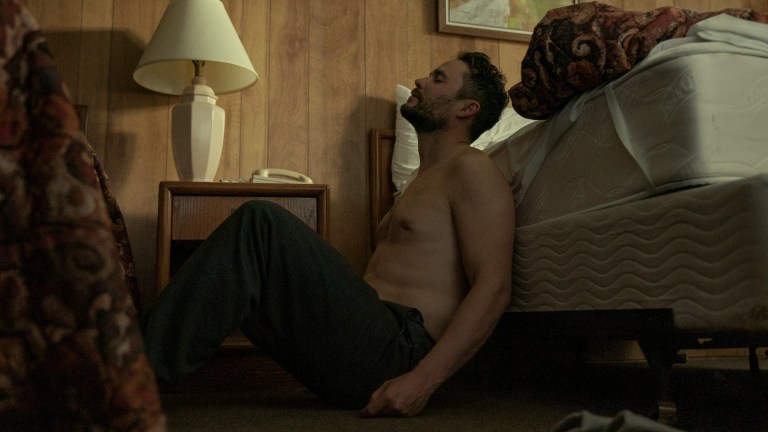Painkiller’s Most Emotional Moments Are Its Intros
Netflix's Painkiller makes compelling art out of a legal necessity.

Legal disclaimers are a necessary part of any TV series that purports to cover real life events. Not only do filmmakers, studios, and distributors want to avoid any potential for litigation, they also must acknowledge to their audiences that no scripted enterprise can perfectly capture reality.
Still, legal disclaimers have a way of taking some of the dramatic wind out of the truly compelling stories they usually precede. It’s hard to fully engage with a narrative when you can practically hear the in-house lawyers scribbling away at the beginning of it. That’s why it’s so impressive how Netflix‘s Painkiller finds a way to remain on solid ethical and legal ground while also priming its viewers for the tragedy to come.
This miniseries, which is a fictionalized retelling of events from the opioid crisis (See what we mean?Necessary, but boring.), begins each episode with a kind of disclaimer we’ve never heard before. The first part of the disclaimer presented in all six episodes certainly sounds familiar. As recited by six different individuals, it reads “This program is based on real events. However, certain characters, names, incidents, locations, and dialogue have been fictionalized for dramatic purposes.”
That’s all fair game. It is indeed crucial to know that the show is based on real events but does not recreate them in perfect fidelity. It’s just not necessarily the strongest rhetorical start to a story that contains real human suffering and despair. Or at least it wouldn’t be if each episode’s disclaimer didn’t continue on after that.
As it turns out, all six of Painkiller‘s intro disclaimers are presented by loved ones of someone who died due to opioid addiction. First up is Jennifer Trejo-Adams, the mother of Christopher Trejo, who concludes the intro with “What wasn’t fictionalized is that my son at the age of 15 was prescribed OxyContin. He lived in years and years of addiction and at the age of 32 he died. All alone in the freezing cold in a gas station parking lot. And we miss him.”
In an email to the The Los Angeles Times, Trejo-Adams said of her participation “We need to share our stories so that maybe someone else won’t be ashamed of theirs,” she wrote in an email. “I’m not ashamed of my son. What happened to him wasn’t his choice. It wasn’t his fault … or mine [now if someone could just tell my heart that].”
Episodes two through six feature similar messages in their pre-credit openers with mothers and fathers mourning their respective children Cassy, Patrick, Elizabeth, Matthew, and Riley – all of whom died following OxyContin use.
It’s a remarkable storytelling choice, the likes of which I can’t recall seeing. It turns what could be a creatively inert moment into unquestionably the most moving and human part of each episode … all while still somehow receiving the apparent blessing of Netflix’s legal team. In an interview with Collider, executive producer Eric Newman explained the reasoning behind the compelling intros thusly:
“When we got into the obligatory disclaimers that I put in the front of all my shows, I generally don’t think twice about. But in this case, [director] Pete [Berg] and I, particularly, were really struggling with the implication that we were letting them off the hook, before the show even started … We really tasked the Netflix legal department with like, ‘How do we get around this? Can we not do it? Can we do it in an inventive way that perhaps undercuts the efforts to dispel the truth of our show?'”
Newman goes on to say that Berg came up with the idea of having survivors of the victims of Oxycontin read the disclaimer and share their stories. He also mentions that it was tragically easy to find these people in the L.A. area as the effects of the opioid epidemic are so widespread.
Painkiller is certainly not without its flaws – both creatively and journalistically. And indeed Hulu’s Dopesick told pretty much the same story in a more effective way just one year ago. Still, it can’t be argued that this series doesn’t put its best foot forward at the beginning of each episode.
All six episodes of Painkiller are available to stream on Netflix now.
